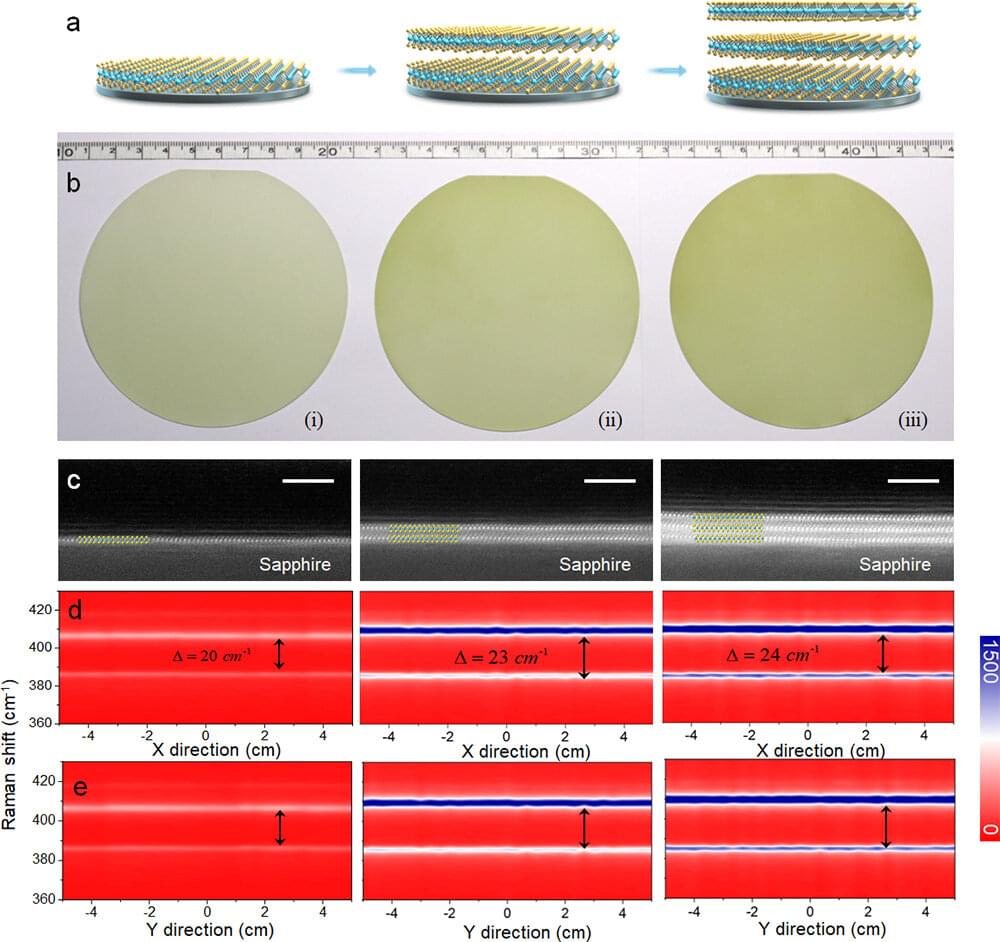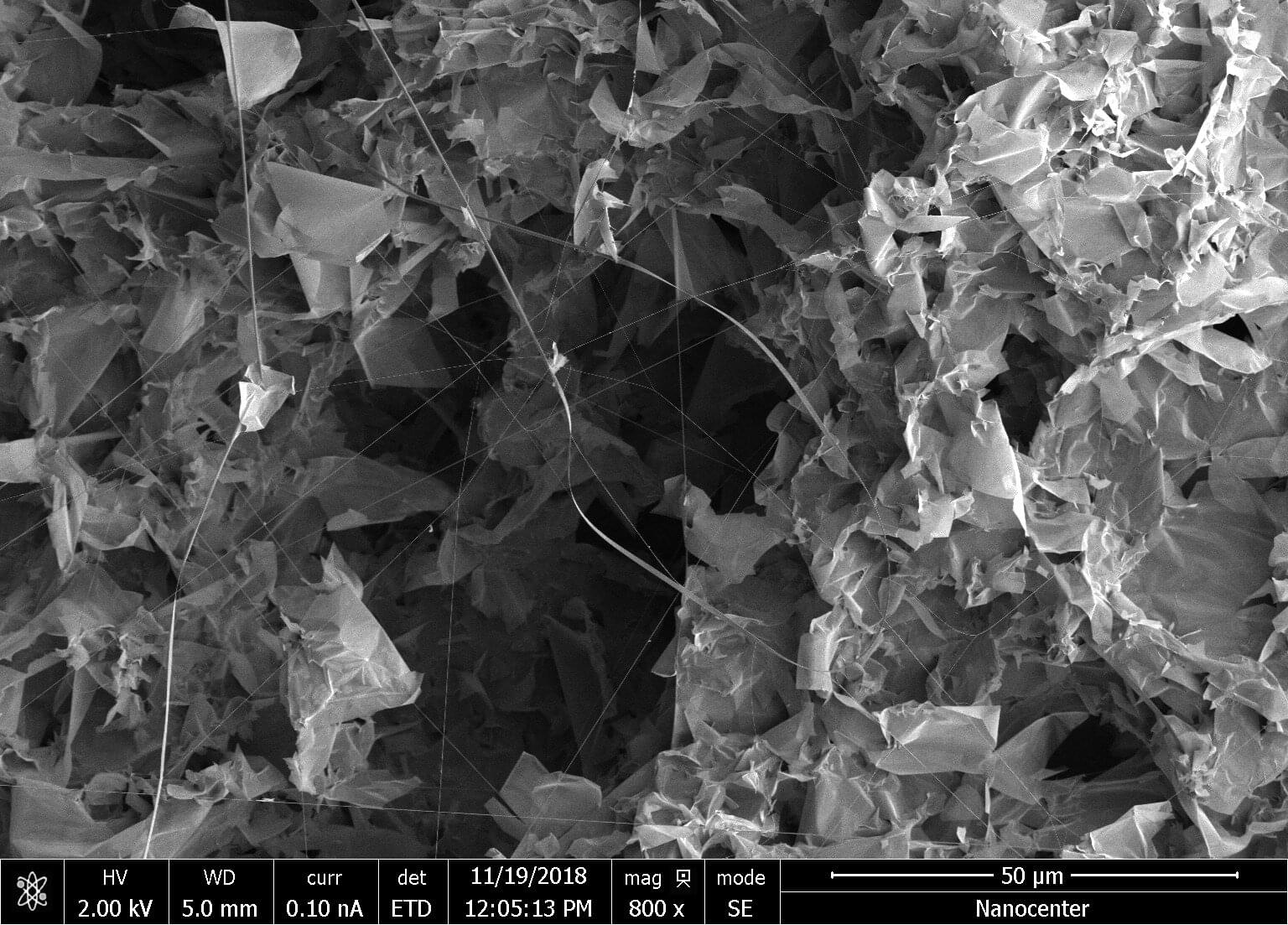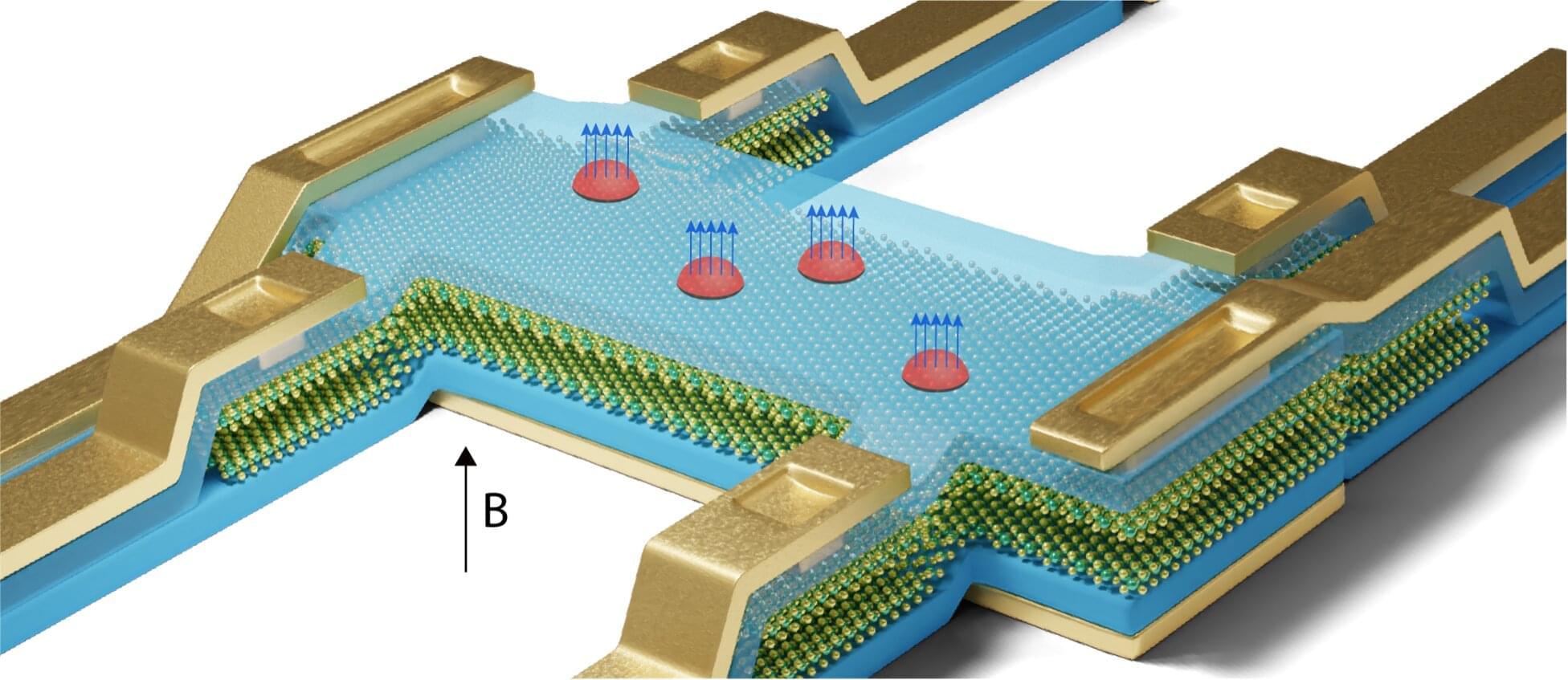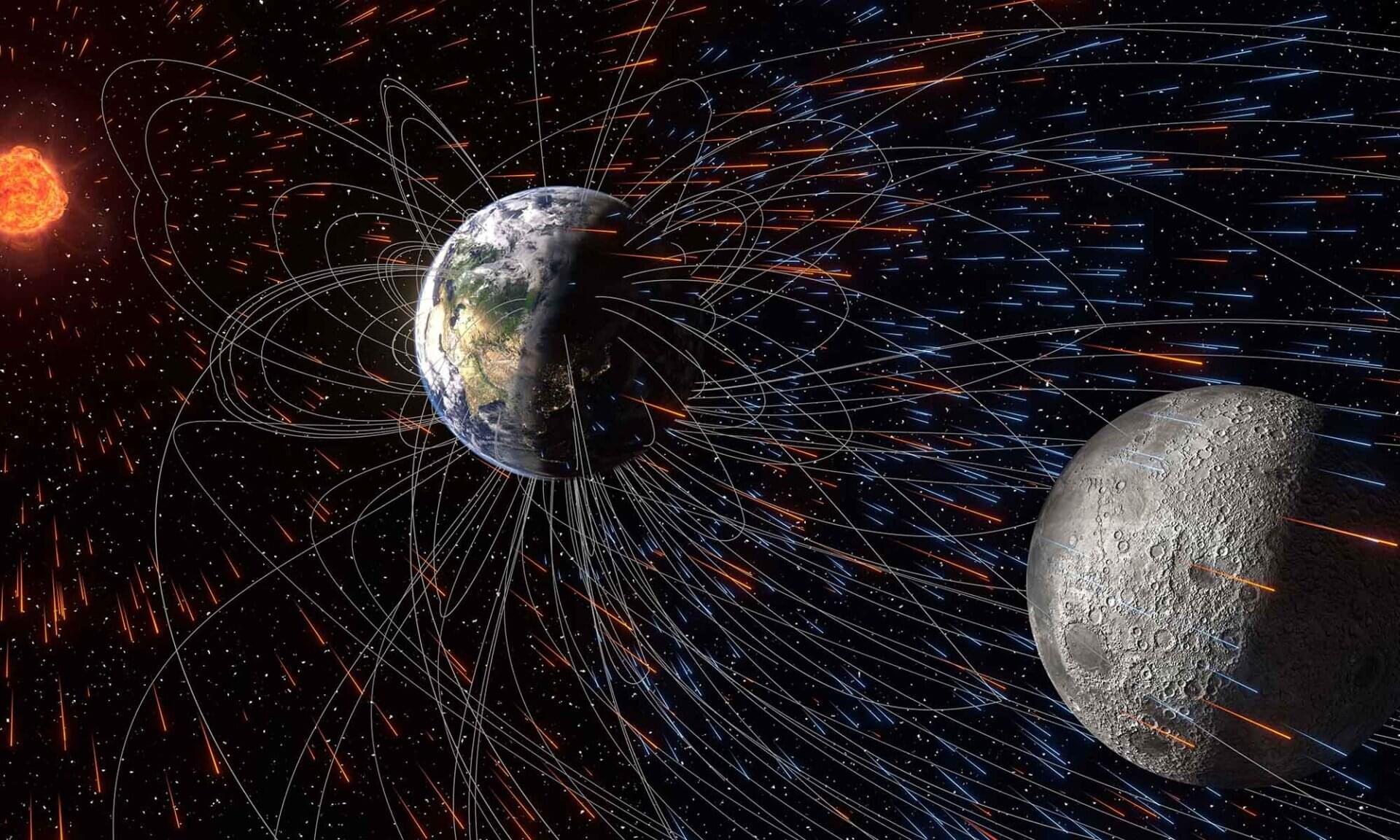Supports high-speed transfer between USB-A and USB-C devices
Category: computing – Page 29

Scientists Uncover How Tiny “Nanopores” Learn Like the Brain
Scientists found that nanopores’ electrical charges control how ions flow and when pores temporarily shut down. The discovery could allow engineers to design nanopores that “learn” like synapses for next-generation computing.
Pore-forming proteins appear across many forms of life. In humans, they help protect the body by supporting immune defenses. In bacteria, they often function as toxins that create openings in cell membranes. These natural pores regulate the movement of ions and molecules, and their precise control over molecular transport has made them valuable in biotechnology, including DNA sequencing and molecular sensing.
Unpredictable Behavior in Ion Flow.

Epitaxial multilayer MoS2 wafers promise high-performance transistors
Two-dimensional (2D) semiconductors, such as molybdenum disulfide (MoS2), enable unprecedented opportunities to solve the bottleneck of transistor scaling and to build novel logic circuits with faster speeds, lower power consumption, flexibility and transparency, benefiting from their ultra-thin thickness, dangling-bond-free flat surface and excellent gate controllability.
Tremendous efforts have been devoted to exploring the scaled-up potentials of monolayer MoS2, including both wafer-scale synthesis of high-quality materials and large-area devices. For instance, four-inch wafer-scale monolayer MoS2 with large domain sizes (up to ~300 μm) and record-high electronic quality (average field-effect mobility of ~80 cm2·V-1 ·s-1) has already been demonstrated via van der Waals epitaxial growth.
In terms of a further improvement of the electronic quality of the large-scale monolayer MoS2, structural imperfections should be eliminated as much as possible; however, there is not much space left for monolayer MoS2 after ten years of synthesis optimizations in this field. Another key direction is to switch to multilayer MoS2, e.g., bilayers and trilayers, since they have intrinsically higher electronic quality than monolayers and thus are conducive to higher-performance devices and logic circuits. However, due to the fundamental limitation of thermodynamics, it is still a great challenge to realize wafer-scale multilayer MoS2 with high-quality and large-scale uniformity.

Real-life ‘quantum molycircuits’ using exotic nanotubes
Molybdenum disulfide MoS2 is a groundbreaking material for electronics applications. As a two-dimensional layer similar to graphene, it is an excellent semiconductor, and can even become intrinsically superconducting under the right conditions. It’s not particularly surprising that science fiction authors have already been speculating about molycircs, fictional computer circuits built from MoS2, for years—and that physicists and engineers are directing huge research efforts at this material.
Researchers at the University of Regensburg, have many years of expertise with diverse quantum materials—in particular also with carbon nanotubes, tube-like macromolecules made from carbon atoms alone.
“It was an obvious next step to now focus on MoS2 and its fascinating properties,” said Dr. Andreas K. Hüttel, head of the research group Nanotube Electronics and Nanomechanics in Regensburg. In cooperation with Prof. Dr. Maja Remškar, Jožef Stefan Institut Ljubljana, a specialist in the crystalline growth of molybdenum disulfide nanomaterials, his research group started working on quantum devices based on MoS2 nanotubes.

New method realize ohmic contacts in n-type MoS₂ transistors at cryogenic temperatures
Semiconducting transition metal dichalcogenides (TMDs) are a class of layered materials exhibiting unique optoelectronic properties that could be leveraged to develop transistors, sensors and other nanoelectronics. Despite their advantages, creating robust ohmic contacts that connect a metal electrode in transistors to semiconducting TMDs at cryogenic temperatures has proved challenging.
This has so far limited the use of these materials for either studying fundamental physics or developing nanoelectronics that operate at low temperatures.
In a paper in Nature Electronics, researchers at the Liaoning Academy of Materials, Shanxi University and other institutes introduced a new technique for realizing ohmic contacts to the TMD molybdenum disulfide (MoS2) at cryogenic temperatures, and found that electron mobility in those transistors can be surprisingly high.

Earth’s atmosphere may help support human life on the moon
The moon’s surface may be more than just a dusty, barren landscape. Over billions of years, tiny particles from Earth’s atmosphere have landed in the lunar soil, creating a possible source of life-sustaining substances for future astronauts. But scientists have only recently begun to understand how these particles make the long journey from Earth to the moon and how long the process has been taking place.
New research from the University of Rochester, published in Communications Earth & Environment, shows that Earth’s magnetic field may actually help guide atmospheric particles—carried by solar wind—into space, instead of blocking them. Because Earth’s magnetic field has existed for billions of years, this process could have steadily moved particles from Earth to the moon over very long periods of time.
“By combining data from particles preserved in lunar soil with computational modeling of how solar wind interacts with Earth’s atmosphere, we can trace the history of Earth’s atmosphere and its magnetic field,” says Eric Blackman, a professor in the Department of Physics and Astronomy and a distinguished scientist at URochester’s Laboratory for Laser Energetics (LLE).

Chip-scale magnetometer uses light for high-precision magnetic sensing
Researchers have developed a precision magnetometer based on a special material that changes optical properties in response to a magnetic field. The device, which is integrated onto a chip, could benefit space missions, navigation and biomedical applications.
High-precision magnetometers are used to measure the strength and direction of magnetic fields for various applications. However, many of today’s magnetometers must operate at extremely low temperatures—close to 0 kelvin—or require relatively large and heavy apparatus, which significantly restricts their practicality.
“Our device operates at room temperature and can be fully integrated onto a chip,” said Paolo Pintus from the University of California, Santa Barbara (UCSB) and the University of Cagliari, Italy, co-principal investigator for the study. “The light weight and low power consumption of this magnetometer make it ideal for use on small satellites, where it could enable studies of the magnetic areas around planets or aid in characterizing foreign metallic objects in space.”

Transistor ‘design limitation’ actually improves performance, scientists find
What many engineers once saw as a flaw in organic electronics could actually make these devices more stable and reliable, according to new research from the University of Surrey and Joanneum Research Materials.
The paper, which will be presented at the IEEE International Electron Devices Meeting (IEDM) 2025, describes how embracing small energy barriers at the metal/semiconductor interface of organic thin-film transistors (OTFTs) can help them perform more consistently and operate more reliably over time.
Organic thin-film transistors (OTFTs) are a key component of what are thought to be the next generation of flexible and wearable electronics. They are lightweight, low-cost and printable on large areas, but their long-term stability has been a persistent challenge.

Tiny optical modulator could enable giant future quantum computers
Researchers have made a major advance in quantum computing with a new device that is nearly 100 times smaller than the diameter of a human hair.
Published in the journal Nature Communications, the breakthrough optical phase modulators could help unlock much larger quantum computers by enabling efficient control of lasers required to operate thousands or even millions of qubits—the basic units of quantum information.
Critically, the team of scientists have developed these devices using scalable manufacturing, avoiding complex, custom builds in favor of those used to make the same technology behind processors already found in computers, phones, vehicles, home appliances—virtually everything powered by electricity (even toasters).

New materials could boost the energy efficiency of microelectronics
MIT researchers have developed a new fabrication method that could enable the production of more energy efficient electronics by stacking multiple functional components on top of one existing circuit.
In traditional circuits, logic devices that perform computation, like transistors, and memory devices that store data are built as separate components, forcing data to travel back and forth between them, which wastes energy.
This new electronics integration platform allows scientists to fabricate transistors and memory devices in one compact stack on a semiconductor chip. This eliminates much of that wasted energy while boosting the speed of computation.